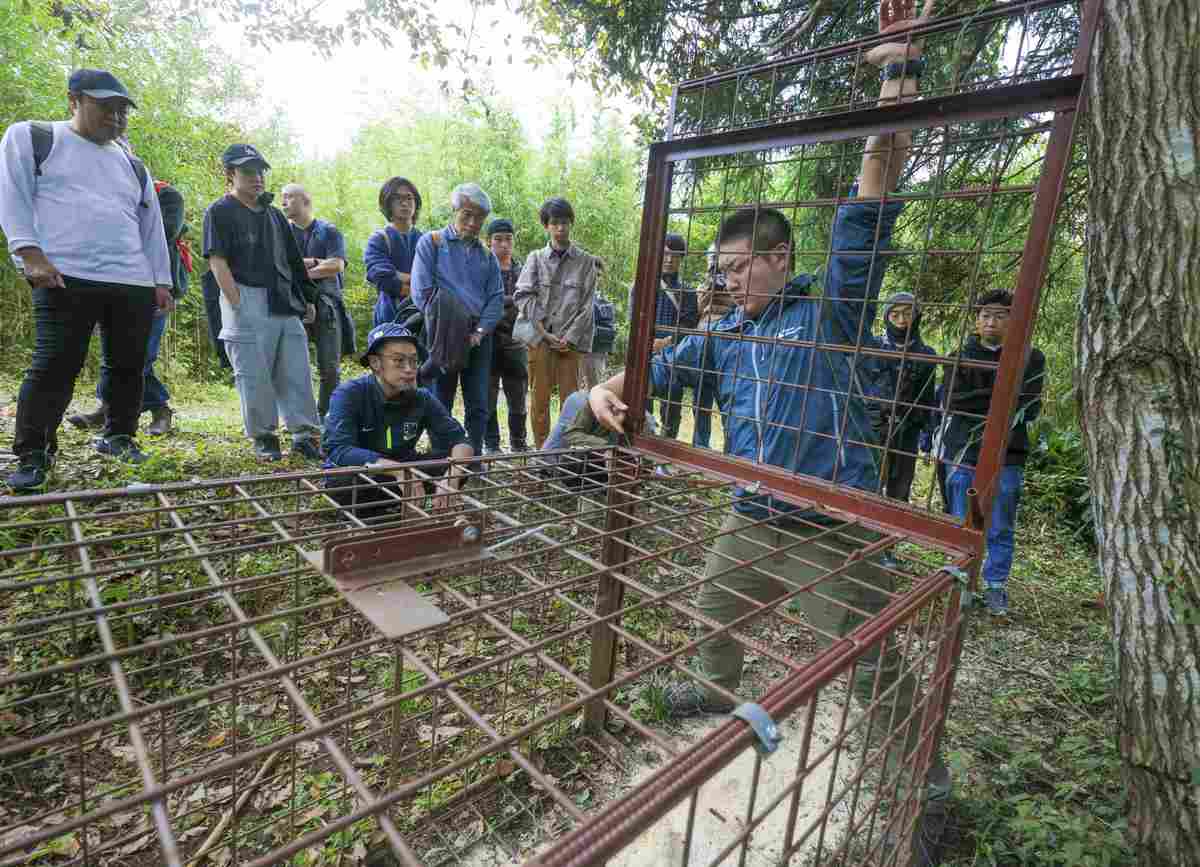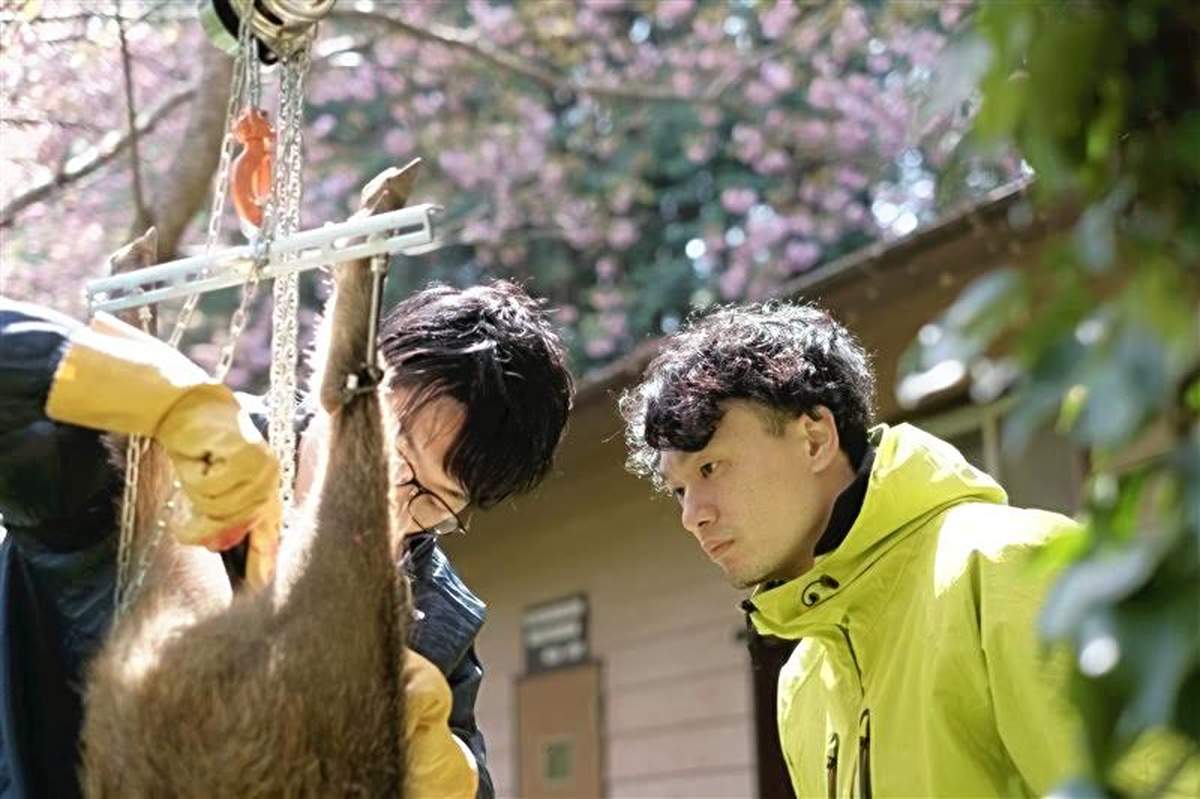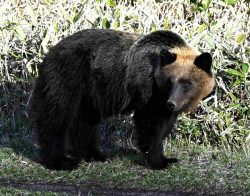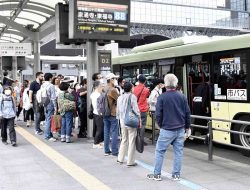Japanese Railway Company Odakyu Expands Hunting Project to Reduce Damage Caused by Wild Animals

A staffer of Hunter Bank, right, shows how to use a box trap to members in Odawara, Kanagawa Prefecture, in November.
14:16 JST, December 22, 2024
Odakyu Electric Railway Co., which offers services from Tokyo to Kanagawa Prefecture, has expanded its program that matches people who are interested in hunting with farmers who are experiencing damage caused by wild animals, as part of its efforts to deal with collisions between trains and wild animals.
The rail company launched the “Hunter Bank” initiative in the prefecture in June 2022, and more than 100 wild boars have been caught in about two years. The company, which is based in Shinjuku Ward, Tokyo, began to expand the program to other parts of the nation in October.
In the afternoon of Nov. 16, about 30 Hunter Bank members confirmed hoof-shaped dents in the ground at several places in a forest in Odawara, Kanagawa Prefecture.
“Please take a good look at them,” a staffer of Hunter Bank said. “They are the footprints of a wild boar.”
He then explained how to use a box trap that is 1 meter wide, 1 meter high and 2 meters long and had been placed nearby.
People who are interested in hunting, regardless of whether they have a license, can take Hunter Bank’s three-month program for ¥45,000. During this period, members can learn such techniques as handling traps as well as capturing and slaughtering animals from licensed staff members.
After the training period, participants can continue being part of Hunter Bank for a monthly fee of ¥8,000. The total number of members exceeded 500 in October, according to Hunter Bank.

Hunter Bank members slaughter a wild boar that has been caught.
The day’s participating members included Keiya Kanno, a 36-year-old video production company owner in Mitaka, Tokyo, who said he is interested in wild game dishes.
“It’s a valuable opportunity to receive guidance and gain experience from hunting with people who have the same interests,” he said.
Odakyu Electric Railway was struggling with the issue of trains colliding with wild boars and deer as there are many forests and agricultural fields along its rail lines, with 52 cases occurring between fiscal 2019 and 2021.
As damage to agriculture and forestry by wild animals had become a social issue, the company decided to have its employees start the Hunter Bank project to connect people interested in hunting with farmers as a measure against such damage.
While Hunter Bank members set up box traps in mountains, forests and other areas where damage by wild animals has been reported, farmers assist them by spreading bait and patrolling the areas. Members then kill animals that have been caught under the guidance of experts.
In fiscal 2023, Hunter Bank caught 32 wild boars in Odawara, which accounted for about 6% of the municipal government’s target. Hunter Bank said it has caught more than 100 wild boars in total.
“We’ve been able to catch wild boars many times,” a farmer said. “Thanks to that, other farmers in my neighborhood have fewer cases of wild boars entering their places and damaging their crops.”
In October, Odakyu Electric Railway began recruiting local management partners in places other than its service areas in order to conduct Hunter Bank activities across the country amid an increase in damage caused by wild animals. Staff members will be dispatched to such places to explain how they manage operations in Odawara and also help attract members to sign in the initiative.
In January, Hunter Bank activities are expected to begin in Hachioji, Tokyo, and members for the effort are being recruited. Inquiries are also coming from hotel operators and hunters associations, according to Hunter Bank.
“By utilizing our operational expertise we’ve built so far, I hope we will contribute to solving the problem of a lack of people that can deal with damage caused by wild animals in various parts of the country,” said Kazuki Arita, an Odakyu Electric Railway employee who is in charge of Hunter Bank operations.
Common issue among operators
Train collisions with wild animals are issues for other railway companies since they not only cause delays to services but can also damage cars.
In November 2021, East Japan Railway Co. (JR East) developed an app with which train drivers, station workers and other employees can share information on wild animals they spotted in places such as near the tracks.
The app allows them to share when and where they saw what kind of animal on a map. Such information can also be sent to the drivers of trains about to run on the tracks where the animals were sighted.
The app is currently being used for the JR Uchibo, Kururi and Sotobo lines in Chiba Prefecture and the JR Koumi Line running in Nagano and Yamanashi prefectures.
Hokkaido Railway Co., meanwhile, changed the timetables for some of its lines in 2022 so that they are calculated with reduced speeds to make it easier for trains to avoid collisions with deer.
JR Hokkaido has taken the step because wheels were often damaged after trains repeated emergency braking to avoid such collisions while trying to keep the trains on time. The measure is also meant to minimize damage to cars when collisions do occur, according to the operator.
Top Articles in Society
-

Producer Behind Pop Group XG Arrested for Cocaine Possession
-

Man Infected with Measles Reportedly Dined at Restaurant in Tokyo Station
-

Man Infected with Measles May Have Come in Contact with Many People in Tokyo, Went to Store, Restaurant Around When Symptoms Emerged
-

Woman with Measles Visited Hospital in Tokyo Multiple Times Before Being Diagnosed with Disease
-

Australian Woman Dies After Mishap on Ski Lift in Nagano Prefecture
JN ACCESS RANKING
-

Producer Behind Pop Group XG Arrested for Cocaine Possession
-

Japan PM Takaichi’s Cabinet Resigns en Masse
-

Man Infected with Measles Reportedly Dined at Restaurant in Tokyo Station
-

Israeli Ambassador to Japan Speaks about Japan’s Role in the Reconstruction of Gaza
-

Videos Plagiarized, Reposted with False Subtitles Claiming ‘Ryukyu Belongs to China’; Anti-China False Information Also Posted in Japan

























